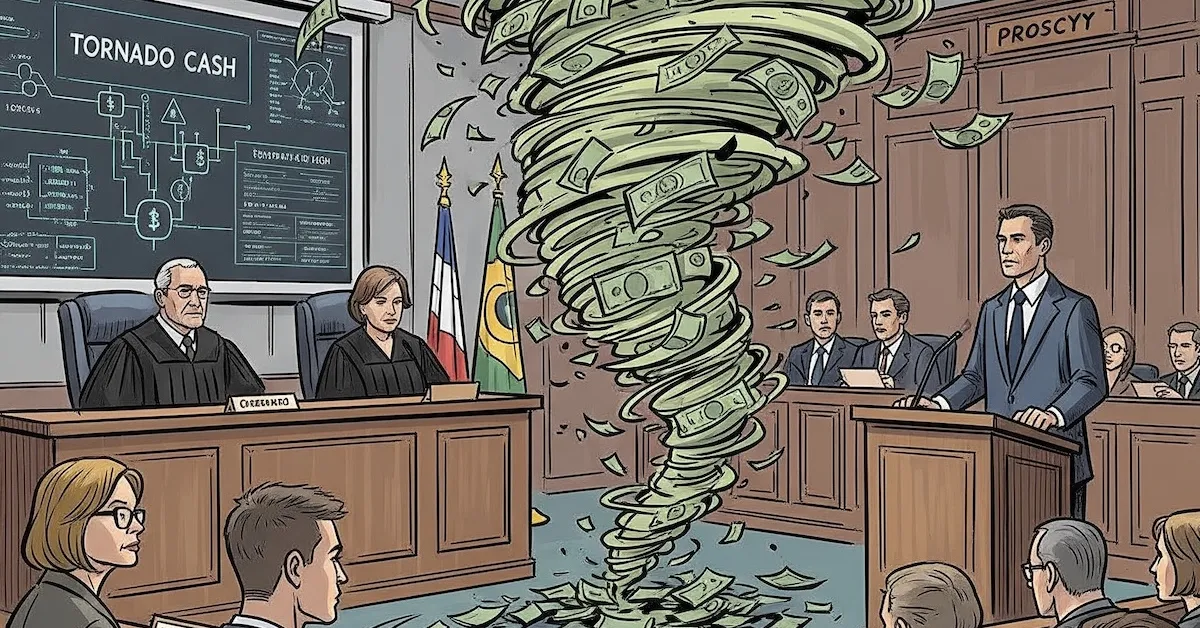Crypto Dev Convicted! Tornado Cash Trial Sets Ominous Precedent

Roman Storm, co-founder of the crypto mixing service Tornado Cash, has been found guilty of conspiracy to operate an unlicensed money transmitting business. This verdict, delivered by a jury in the Southern District of New York (SDNY) after three and a half days of deliberation, concludes a high-profile trial that began in the middle of last month. Storm now faces up to five years in prison for this conviction. The jury, however, did not reach a unanimous verdict on the other two counts against him: conspiracy to commit money laundering and conspiracy to violate sanctions.
The implications of the Tornado Cash trial have been a significant concern for developers of noncustodial Bitcoin and crypto technology, as well as privacy-preserving software. Amanda Tuminelli, executive director and chief legal officer for the DeFi Education Fund, extensively discussed these stakes in an interview coinciding with the trial's final week. Tuminelli, an expert on 18 U.S. Code § 1960, the U.S. federal law prohibiting the operation of an unlicensed money transmitting business, argued that Storm had not violated this statute in creating and operating Tornado Cash, an Ethereum-based crypto mixing service.
During the interview, Tuminelli highlighted legislative efforts like the CLARITY Act and the Blockchain Regulatory Certainty Act (BRCA). These bills contain language designed to protect developers of "non-controlling" (noncustodial) crypto technology, stipulating that such developers and purveyors do not require a money transmitting license and should not be subject to existing money transmission laws. Furthermore, Tuminelli criticized the Department of Justice’s (DoJ) shift away from 2019 FinCEN guidance, warning that it threatens innovation in the crypto space and could lead to further prosecutions of developers like Storm, despite a memo from U.S. Deputy Attorney General Todd Blanche indicating the DoJ would cease targeting crypto entities, including mixing services, for the acts of their end users.
Following the guilty verdict, the prosecution motioned to remand Storm into custody, asserting he was a flight risk. However, Judge Failla rejected this motion. The defense, led by Ms. Klein, successfully argued against the flight risk claim, citing Storm's $2 million bail bond secured by his Washington state home, his partial custody of a daughter and presence of his girlfriend in the U.S., his parents being green card holders, and the substantial support from the U.S.-based crypto community, which is expected to continue during his appeal. Judge Failla noted that the "stability of the verdict is still in play," indicating the likelihood of an appeal, and acknowledged that Storm's "incentives have shifted tremendously," before denying the remand request.
Shortly after the verdict, U.S. Attorney for the SDNY, Jay Clayton, issued a statement. Clayton asserted that "Roman Storm and Tornado Cash provided a service for North Korean hackers and other criminals to move and hide more than $1 billion of dirty money." He emphasized the potential of stablecoins and digital assets but cautioned against using such promise as an excuse for criminality, committing his office to holding accountable those who exploit emerging technologies for crime. Notably, Clayton's statement made no mention of U.S. Deputy Attorney General Todd Blanche's memo regarding the DoJ's intention to stop "regulation by prosecution" in the crypto space or the fact that the vast majority of funds moved through Tornado Cash users were not proven to have been obtained illicitly. The ongoing legal battle underscores the complex regulatory landscape facing cryptocurrency developers and the broader digital asset community.
You may also like...
Why Do Africans Become More African After Leaving Africa?

Why do Africans abroad suddenly embrace their roots with pride? From Afrobeats in London to Yoruba weddings in New York,...
Boxing Icon's Son in Legal Turmoil: Julio Cesar Chavez Jr. Faces Cartel Allegations & Deportation Drama!

Mexican boxer Julio César Chávez Jr. has been deported from the U.S. to Mexico, where he was immediately jailed for alle...
Super Falcons Make History: Nigeria Crowned WAFCON Champions for 10th Time in Thrilling Win!
)
Nigeria's Super Falcons made history by clinching their 10th Women's Africa Cup of Nations title with a spectacular 3-2 ...
Paolo Sorrentino's 'La Grazia' Dazzles Venice, Earns Raves

Paolo Sorrentino's latest film, 'La Grazia,' captivated the Venice Film Festival, earning a four-minute standing ovation...
KPop Demon Hunters Ignites Oscar Buzz, Captivates Audiences

The animated film "KPop Demon Hunters" has emerged as a record-breaking global phenomenon, topping Netflix viewership ch...
Naira Marley Breaks Silence: Explosive Defense in Mohbad Case Rocks Nigeria!

Naira Marley has released a documentary sharing his side of the story regarding the tragic death of his former signee, M...
Fans Buzzing as Reading & Leeds Festival Teases Major Secret Headliners!

Anticipation is high for the 2025 Reading and Leeds Festivals, with widespread rumors of secret sets from bands like Wol...
Britpop Backlash: Oasis Reunion Fuels Fan Fury, Ticketmaster Under Fire!

Oasis is set to embark on a highly anticipated reunion tour with Andy Bell confirming his involvement, playing 41 dates ...